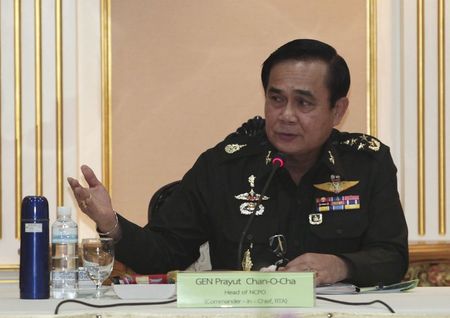By Amy Sawitta Lefevre
BANGKOK (Reuters) - Thailand's military government said on Tuesday it would hold its largest festival yet in the Thai capital, part of a propaganda campaign aimed at national reconciliation after the junta's May coup.
The seizure of power by General Prayuth Chan-ocha has been condemned by Western countries. Prayuth has said the coup was required to restore the rule of law after six months of sometimes violent protests weakened Thailand's government and institutions.
The military have held festivals in parks and squares to get the public behind its rule, while at the same time moving to curtail freedom of expression and prevent public opposition to the coup.
The festival will be held on July 22-25 in Sanam Luang Park, an open field in Bangkok's historic area.
"We will have tools to build national harmony and return happiness to Thais," Banpot Poonpian, a spokesman for the military's Internal Security Operations Command, told reporters.
"There will be many activities including shows by rock bands, a film and prayers to ask for peace."
Since taking power the military has shut down thousands of independent radio and television stations, allowing them to reopen only on condition that they do not broadcast what it deems to be inflammatory material. It has also blocked hundreds of websites.
Anti-coup protests popped up in the days after the coup but have fizzled out since due to a raft of repressive measures endorsed by the military.
MEDIA CRACKDOWN
The country's media, including newspaper editors and talkshow hosts, have come under particular scrutiny.
In a televised speech on Friday junta leader General Prayuth Chan-ocha asked the media to "develop measures to control contents of the media".
"I appeal to all those involved with the media to set standards and develop measures to control contents of the media. Should any media continue to provide false information or information that is damaging to the country, then you will have to take responsibility," Prayuth said, without giving further details.
The military says it needs the media's cooperation to achieve national reconciliation.
Thailand has been split for nearly a decade. On the one side are the mostly rural supporters of former premier Thaksin Shinawatra. On the other side are Bangkok's middle class backed by the royalist establishment who accuse Thaksin of, among other things, vote buying and nepotism.
Thaksin was ousted by the army in 2006 and lives abroad to avoid a two-year jail term handed down in 2008 for graft.

The junta has rolled out a three-phase plan that includes national reconciliation, an interim constitution and government by September and an election in late 2015.
It has taken upon itself the task of "getting the country in order" tackling everything from unruly taxi drivers to reviving an economy badly bruised by months of unrest, including the tourism sector which accounts for around 10 percent of the economy.
(Additional reporting by Pracha Hariraksapitak; Editing by Simon Webb and Jeremy Laurence)
